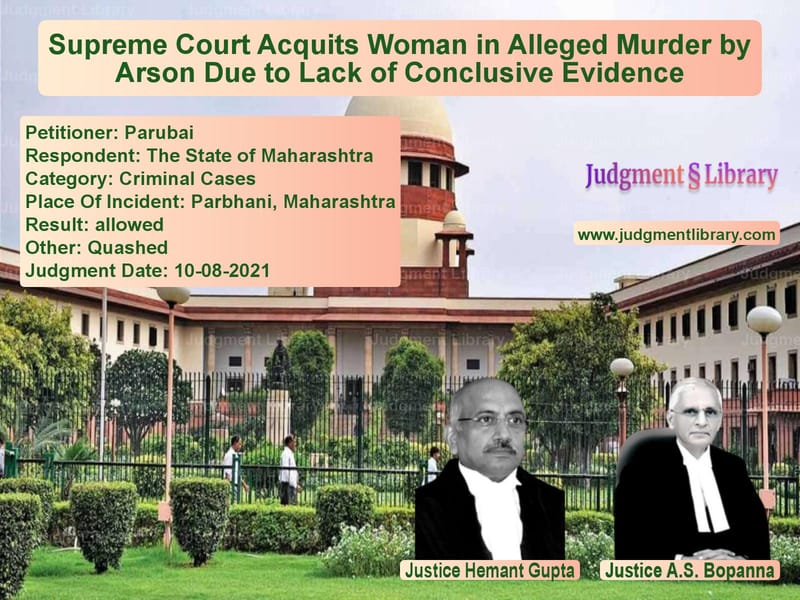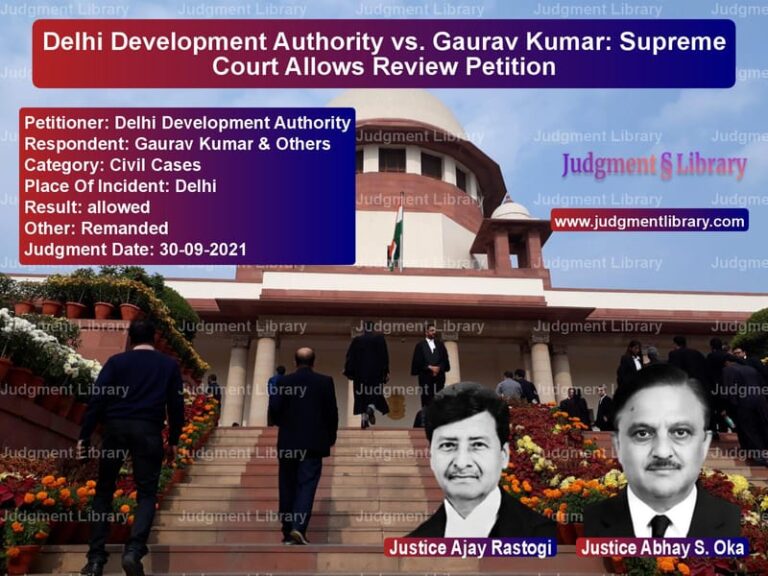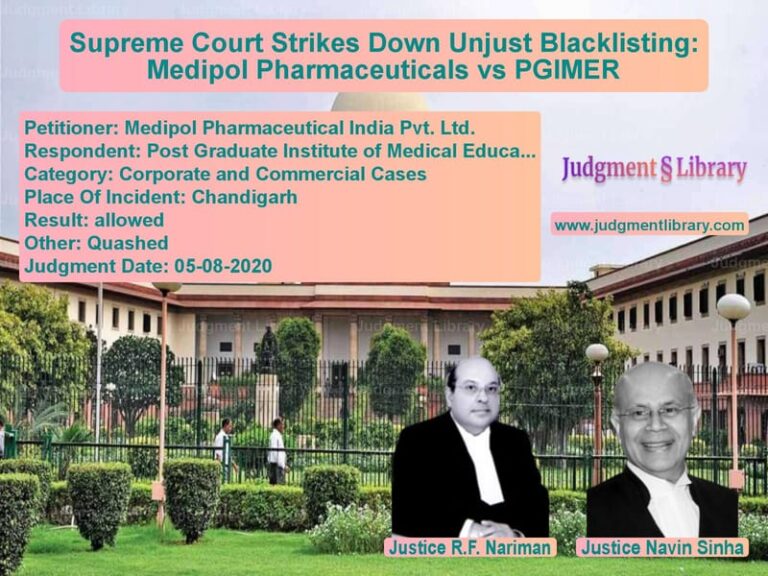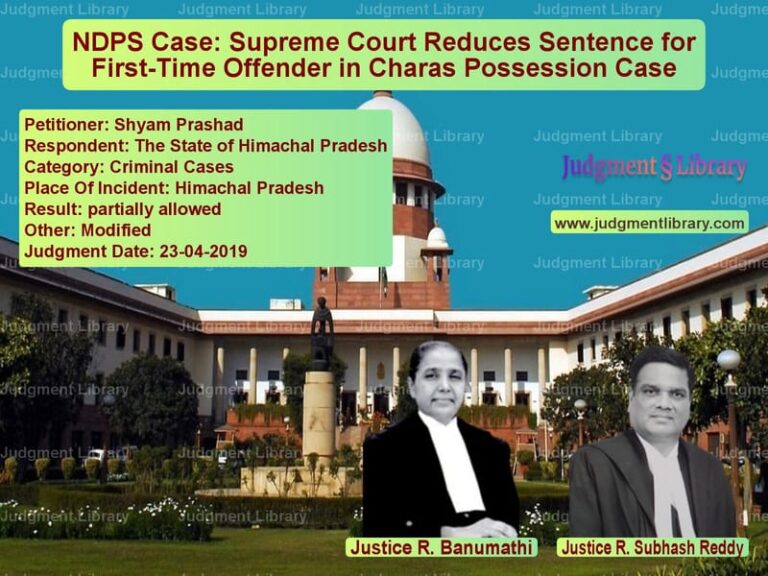Supreme Court Acquits Woman in Alleged Murder by Arson Due to Lack of Conclusive Evidence
The case of Parubai vs. The State of Maharashtra concerned a tragic fire incident that resulted in the deaths of a woman and her two children. The appellant, Parubai, was accused of setting fire to their house, allegedly out of animosity toward her husband’s first wife. The prosecution built its case on circumstantial evidence, and both the trial court and the High Court found her guilty, sentencing her to life imprisonment. However, the Supreme Court overturned the conviction, ruling that the evidence was insufficient to sustain a conviction for murder.
Case Background
The incident occurred on the night of August 2-3, 2006, in Parbhani, Maharashtra. The victims, Mandabai (the first wife of Gulab) and her two minor children, Akash (5 years old) and Nikita (2 years old), were sleeping inside their house when a fire broke out. While they suffered fatal burns, the accused, Parubai (the second wife of Gulab), escaped unharmed.
Read also: https://judgmentlibrary.com/murder-conviction-upheld-supreme-courts-ruling-in-bihar-criminal-case/
The prosecution alleged that Parubai had set fire to the house due to a family dispute, intending to eliminate Mandabai and her children to gain complete control over the household. A case was registered against her under Sections 302 and 436 of the Indian Penal Code (IPC), and after a full trial, she was convicted and sentenced to life imprisonment.
Arguments by the Appellant (Parubai)
- There was no direct evidence linking Parubai to the fire, and the entire case was based on circumstantial evidence.
- “The mere fact that the accused survived the fire while others perished does not prove guilt,” argued her counsel.
- The house contained kerosene lamps and cooking fuel, making an accidental fire a plausible explanation.
- The police failed to establish that the fire was deliberately set and not accidental.
- The alleged recovery of a kerosene can from her possession was fabricated and lacked forensic verification.
Arguments by the Respondent (State of Maharashtra)
- The prosecution contended that Parubai had a strong motive, as she wanted her husband’s first wife and children out of the way.
- “The fact that the accused escaped unscathed while the victims suffered fatal burns is highly suspicious,” the prosecution pointed out.
- Traces of kerosene were found on the clothes of the deceased child Nikita, suggesting that the fire was deliberately started.
- The accused had allegedly threatened the victims before the incident, indicating premeditation.
Supreme Court’s Observations
The Supreme Court examined the following key issues:
1. Did the circumstantial evidence form a complete chain of events leading to the accused’s guilt?
- The Court ruled that the prosecution’s evidence did not form a conclusive chain leading exclusively to Parubai’s guilt.
- “Conviction cannot be based merely on suspicion, and the prosecution must establish guilt beyond a reasonable doubt,” the judgment stated.
2. Was the lack of injuries on the accused sufficient to prove guilt?
- The Court observed that escaping a fire does not necessarily indicate criminal intent.
- “The mere absence of burns on the accused is not conclusive proof of her involvement in setting the fire,” the Court noted.
3. Was there an alternative explanation for the fire?
- The Court found that the presence of kerosene lamps and cooking fuel made an accidental fire a plausible cause.
- “The prosecution failed to eliminate the possibility of an accidental fire,” the Court ruled.
Supreme Court’s Judgment
The Supreme Court ruled:
- “The conviction and life sentence of the appellant are set aside.”
- “The appellant is acquitted of all charges and shall be released immediately.”
- “Suspicion, however strong, cannot take the place of proof beyond reasonable doubt.”
Conclusion
The Supreme Court reaffirmed that conviction in criminal cases must be based on solid proof, not conjecture. The ruling highlights the importance of establishing a complete and conclusive chain of circumstantial evidence before convicting an accused. The benefit of doubt was given to the accused, ensuring that mere suspicion did not result in wrongful imprisonment.
Read also: https://judgmentlibrary.com/supreme-court-clarifies-premature-release-policy-for-life-convicts/
Petitioner Name: Parubai.Respondent Name: The State of Maharashtra.Judgment By: Justice Hemant Gupta, Justice A.S. Bopanna.Place Of Incident: Parbhani, Maharashtra.Judgment Date: 10-08-2021.
Don’t miss out on the full details! Download the complete judgment in PDF format below and gain valuable insights instantly!
Download Judgment: parubai-vs-the-state-of-maharas-supreme-court-of-india-judgment-dated-10-08-2021.pdf
Directly Download Judgment: Directly download this Judgment
See all petitions in Murder Cases
See all petitions in Attempt to Murder Cases
See all petitions in Custodial Deaths and Police Misconduct
See all petitions in Judgment by Hemant Gupta
See all petitions in Judgment by A. S. Bopanna
See all petitions in allowed
See all petitions in Quashed
See all petitions in supreme court of India judgments August 2021
See all petitions in 2021 judgments
See all posts in Criminal Cases Category
See all allowed petitions in Criminal Cases Category
See all Dismissed petitions in Criminal Cases Category
See all partially allowed petitions in Criminal Cases Category







